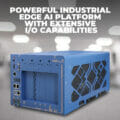
The built environment in the UK is responsible for up 30% of the country’s annual CO2 emissions. Modern methods of construction (MMC), also known as smart construction, is being employed for commercial buildings and residential homes to help make the industry more sustainable. Making UK buildings ‘more green’ is a key factor in achieving the legally binding target of net zero carbon emissions by 2050. So, what is MMC and how is it beneficial?
What are modern methods of construction?
Modern methods of construction refers to off-site processes for producing buildings, put in place as alternatives to traditional on-site building. Primarily, this involves creating panelled units in a factory setting, from walls, pre-fabricated floors, and roof cassettes to pre-cast concrete foundations.
MMC vs traditional construction methods
MMC was introduced to speed up the process of delivering new buildings while maintaining high standards in terms of quality.
Indeed, many buildings created using modern methods of construction far surpass the quality of their traditional counterparts, even in terms of durability. Cost was the priority of older structures which commonly need repair after just a few decades, such as the public buildings that are at risk of collapse thanks to the use of reinforced autoclaved aerated concrete (RAAC) in the ceilings.
Modern construction methods also significantly improve the sustainability of the building. This is achieved in several ways. Firstly, the structures themselves are created using more environmentally-friendly materials wherever possible, such as reclaimed wood, bamboo, and adobe rather than concreate and brick which contribute to greenhouse gas emissions when created. Modular buildings are also more energy efficient thanks to better insulation and energy-saving fixtures.
MMC also allows for more flexibility with buildings in the UK. Structures created through modern methods of construction are easily dismantled and the majority of parts can be recycled. Companies can also take advantage of modular building hire for one-off projects: these temporary structures can be designed to your specifications and then removed and repurposed when no longer needed.
Lastly, MMC fulfils its brief of being a more efficient way to produce buildings in the UK. Creating identical segments of the structures in a factory setting reduces labour and transport costs, eliminates unnecessary waste, helps to guarantee quality, and speeds up product delivery.
MMC in the UK
Buildings created using modern methods of construction are sometimes seen in a negative light. This is largely thanks to the low-quality pre-fabricated buildings that were hastily assembled across the UK following the devastation of World War II.
However, since then MMC has seen significant development that has led to it becoming a greener and more efficient process for delivering buildings that match and even surpass the quality and functionality of traditional buildings in the UK. Modern methods of construction are certainly set to be a core part of the UK’s aim to revolutionise the built environment in the years ahead.







